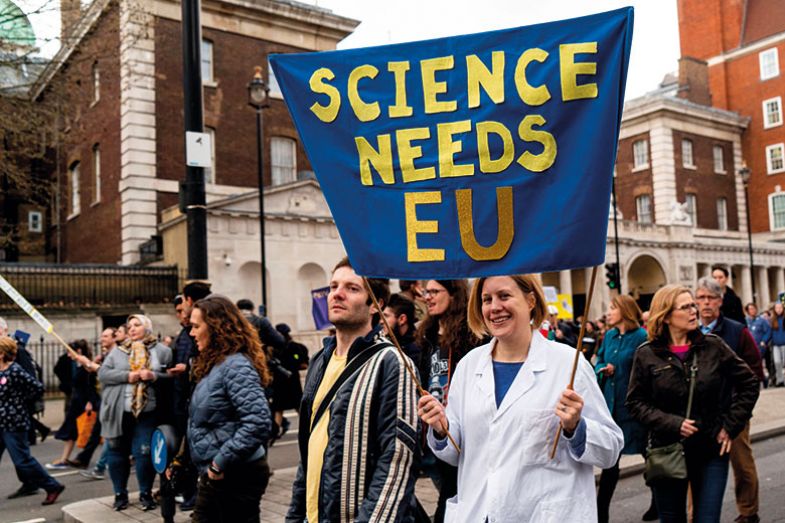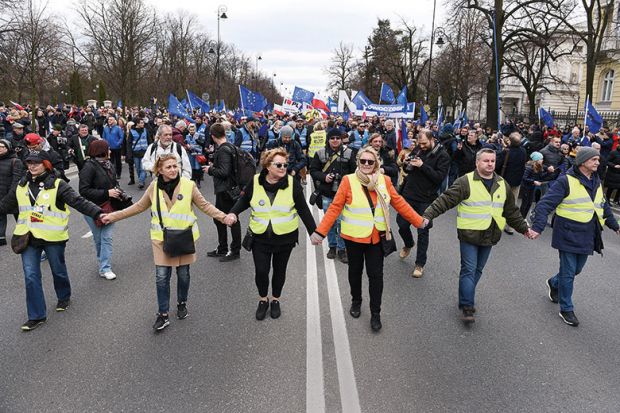The heart of the European project is not its internal market or its competition or trade policy. Nor is it the monetary union or the Common Agricultural Policy. It is the set of values on which the member states have agreed: respect for human dignity and human rights, freedom, democracy, equality and the rule of law.
These values are enshrined in Article 2 of the European Treaty and were inspired by the atrocities of the Second World War. But Article 2 says more. It talks about these values “in a society in which pluralism, non-discrimination, tolerance, justice, solidarity and equality between women and men prevail”.
Upholding these values has never previously been a big issue. They have mainly featured in the accession criteria for new member states and in EU external policies towards countries such as Turkey, Russia and China. But, today, the situation is different. In Poland, the independence of the judiciary is endangered. In Hungary, the lives of civil society organisations and universities – in particular, the Central European University and the Academy of Sciences – are being made difficult. And journalists have been killed in Malta, Bulgaria and Slovakia – indeed, Slovakia’s former prime minister also said that there was no place in his country for Muslim refugees.
Carnegie Europe’s 2017 report, “Defending EU Values in Poland and Hungary”, is right to say that “countries, like individuals, can trust each other only if they share values of democracy and rights, because these define acceptable behaviour between stakeholders. If that trust disappears, cooperation stops and integration unravels.” Add Brexit and the rise of anti-EU political parties across the continent and you have a recipe for considerable unravelling.
In such circumstances, I believe that the scientific community across Europe has a special responsibility to speak up and show that we still believe in our European values. Indeed, science cannot flourish without them. Take integrity. Let’s make it clear that we apply the highest standards of integrity and ethics and are ruthless towards scientific misconduct.
In 2017, at my request, ALLEA, the European Federation of Academies of Sciences and Humanities, updated and modernised the European Code on Research Integrity, inserting new notions such as data integrity. With so much researcher mobility between nations, it would make a lot of sense if all European nations adopted it.
Just establishing rules is, however, not enough. They need to be embedded in the science community and monitored. Too often in the past, the responsibility for scientific misconduct was put on the individual researcher. The European Commission is right to increasingly insist that host institutions also accept some responsibility. It was also right, last year, to re-establish the European Group on Ethics in Science and New Technologies: a body of 15 ethics experts to advise it on the social consequences of developments such as gene editing, artificial intelligence, big data and automated driving.
Respecting the highest levels of integrity and ethics will allow us to stand up against sceptics and make it clear that science is not “just another opinion”.

Another important value is trust. Science can function only in a trust-based system, in which there is complete freedom and autonomy. We can be proud of having such a system in most EU member states. However, in Hungary, gender studies has been banned and, in Poland, objective research on the Holocaust was endangered when it was proposed that criticising the role of Polish citizens and politicians would be made a criminal offence.
Europe’s science community must be much more vocal in condemning such moves and showing solidarity with affected colleagues. For this reason, I was very happy when I read February’s public statement by Academia Europaea, the EU’s Academy of Humanities and Sciences, in support of the Hungarian Academy of Sciences, after the government stripped it of its responsibility for financing research institutions and threatened to annex its premises.
But accountability is also important. In the scientific context, I don’t just mean financial accountability, but accountability to society for the research that is being done and financed by the public purse. We should not be afraid of this.
Accountability is partly about showing impact. But while I fully support the trend for funding agencies to ask applicants for impact statements when it comes to mission-oriented research, I remain sceptical about requesting it for frontier research. That is why I have always opposed it for the European Research Council, at whose birth I was proudly present and whose completed projects have nevertheless made major social or economic contributions in 79 per cent of cases, according to its own retrospective analysis.
Beside extending knowledge, the most important impacts of science are the training of young people and providing scientific support to policymakers. For politicians ultimately to take their decisions on “political” grounds is, of course, their right, but it is important that they know what the scientific evidence says on the topic concerned. This is why the EU’s Scientific Advisory Mechanism, consisting of seven distinguished scientists and five European academy networks, is so vital.
Accountability obviously goes hand-in-hand with transparency, best defined as operating in such a way that others can easily follow what you are doing. The broad public consultation that the commission performed a few years ago on open science put transparency high on the agenda. As the League of European Research Universities rightly puts it in its position paper on the subject, “open science opens up new ways in which research/education/innovation are undertaken, archived and curated, and disseminated across the globe”. A key component is open access to publications and data and, in my previous capacity as open access envoy of the European Commission, I worked on this until recently, overseeing the development of Plan S. Social media also offers enormous opportunities for the science community to reach out to society and present what research is being done, how and why. Of course, it also leads to exposure and vulnerability – but we should not be afraid of this.
Inclusiveness is another hot topic and contains several dimensions, relating to factors such as gender and geography. One of the main questions is how far we should go in requiring inclusiveness in European research funding. I have always been very clear that quotas should never be imposed for political reasons – especially on the excellence-driven ERC. At the same time, however, we need to open up research networks – and let’s be clear: there is not a single country in Europe that has a monopoly on excellence. The most brilliant young researchers I came across during my time at the commission were located in Hungary, the Czech Republic, Bulgaria and Romania.
The final European value I want to talk about – and the most important in the context of the current political climate in Europe and, of course, Brexit – is cooperation. We all know that internationally co-authored publications are the most highly cited, and we all know the African proverb that if you want to go fast, go alone, but if you want to go far, go together.
In relation to Brexit specifically, I would make these observations. There are currently some 32,000 EU nationals working and 12,000 European PhD students studying at UK institutions. Between 2005 and 2014, 450,000 research papers were co-authored by British and European researchers. Under Horizon 2020, 12,000 British participants are expected to receive around €9 billion. More than 2,300 British researchers are involved as experts in the evaluation of project proposals.
These figures tell you how strong the cooperation is between British researchers and their colleagues from the Continent. And this cooperation is the result of many years of networking, mutual respect, partnership and friendship. Some British politicians think that you can replace such bonds overnight by “going global”, but this is just naive. Thinking that setting up a UK-based version of the ERC will make up for the real thing is more than naive. Just ask the Swiss: they tried to do something similar when they were excluded from Horizon 2020 in 2014.
There is, however, some light on the horizon. In its proposal for the next framework programme, Horizon Europe, the commission has established the legal basis for the UK’s full association. Therefore, I hope that there will be an orderly Brexit that will allow this to happen – though even better, of course, would be no Brexit at all.
Whatever politicians in their wisdom decide to do, scientists and representatives of the science system from the UK and the rest of Europe will always cooperate.
In the early 20th century, the famous Solvay conferences of world-leading physicists, held in Brussels, were considered crucial to driving important advances in the field. I believe that a new Solvay-type conference should be organised: not to discuss any scientific issue in particular, but to celebrate the beauty of science cooperation across borders. We need to make it clear that we, as representatives of the European science community, will stand together and are committed to the fundamental values of the EU and of our European society as a whole: respect, freedom, equality, democracy and cooperation. Cooperation beyond borders. Cooperation beyond Brexit.
Robert-Jan Smits is president of the Eindhoven University of Technology. Between 2010 and 2018, he was director-general of research and innovation at the European Commission, following which he became the commission’s special adviser on open access and innovation until earlier this year. This is an edited version of his 2019 Jevons Lecture, titled “Science Cooperation Beyond Brexit”, delivered on 28 March at the University of Manchester.




